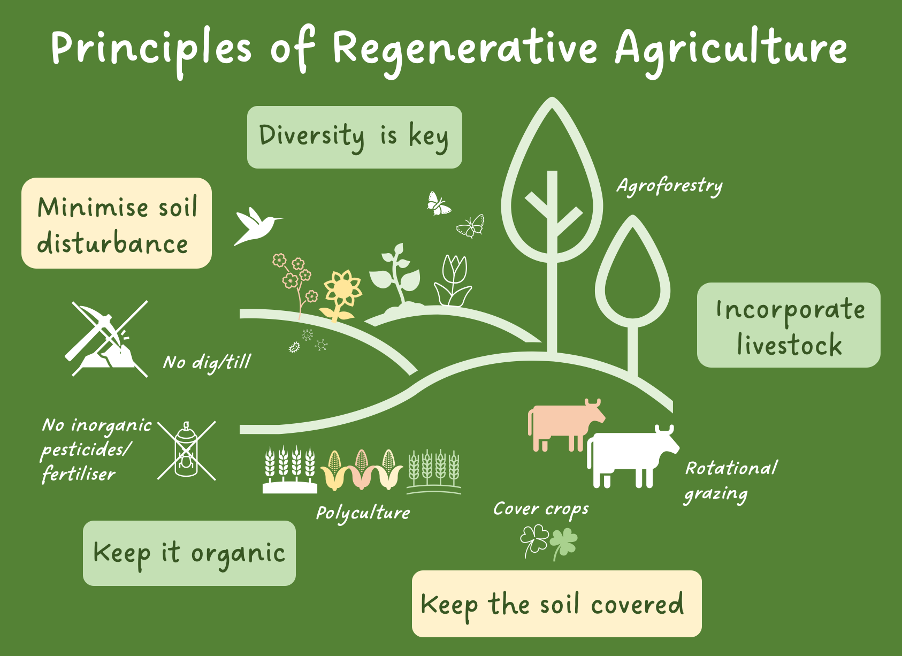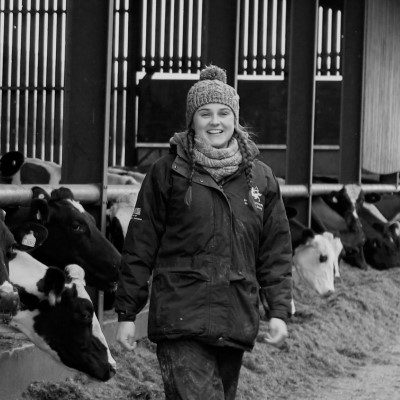CIEL | Blog: Shifting the narrative from regenerative agriculture to agroecology
Paddy Tarbuck

Sustainable food systems
Our current food system is unsustainable. Responsible for a third of global Greenhouse Gas (GHG) emissions, alongside global deforestation and biodiversity loss, the food and farming sector faces an unprecedented challenge.
But there’s a separate and unifying narrative beginning to emerge that instead reimagines future food systems as regenerative and circular, balancing social foundations within planetary boundaries.
So, how can global food systems safeguard the regenerative capacity of the planet and its resources, whilst addressing food security and ensuring sustainable, healthy diets for a growing global population. In short, how do we produce food sustainably?
Regenerative Agriculture
In our collective efforts to drive innovation and climate solutions in the sector, we have given rise to terms such as regenerative agriculture, promoting alternative methods to conventional or industrial agriculture. It’s a term promoted readily by advocacy groups, parts of the farming community and more recently, large corporations. But what is regenerative agriculture and why have some farmers objected to the framing of this term?
Regenerative agriculture is generally understood as a conservation-based approach to farming, seeking to optimise soil health through regenerative practices that improves, rather than degrades the environment and the resilience of farming systems.
It’s symbolised by five main principles, which were highlighted at this year’s Groundswell Agriculture Conference, attended by CIEL, and highlighted in a blog by CIEL’s Projects and Knowledge Exchange Manager [See blog by Sarah]:
- Don’t disturb the soil
- Keep the soil surface covered
- Keep living roots in the soil
- Grow a diverse range of crops
- Bring grazing animals back to the land
Healthy soils
These principles support the notion that everything starts with the soil, advocating for farming practices, such as regenerative grazing and no-till farming, that restore degraded soils, rebuild soil organic matter, and ultimately strengthen soil health. With the intensification of farming systems in the 1950s, reinforced by post-war food policies here in the UK, our soil has become increasingly depleted and subsequently, the message of regenerative agriculture has resonated with many.
Some farmers are already reaping the benefits through more resilient crops in the face of increasing climate risk and periods of drought and heavy rain, as well as stronger root systems that are more likely to produce nutrient-dense food.
Prioritising soil health through regenerative farming practices clearly supports farm resilience, when adopted within a place-based systems approach, but what about promoting soil health for carbon and biodiversity outcomes?
Carbon Sequestration
Recently highlighted in CIEL’s Net Zero & Livestock report titled ‘Bridging the gap’ , “soil plays a significant role in the global carbon cycle, with twice as much carbon stored in the soil than in the atmosphere”. Farmers and land managers, as custodians of soil health, therefore, have the ability to operate as ‘carbon farmers’, optimising soil carbon sequestration by adopting regenerative practices. The IPCC underscored this opportunity in its recent sixth assessment report chapter on agriculture, forestry and land-use(AFOLU), where scientific consensus pointed to the significant mitigation potential of agriculture from cropland and grassland soil carbon management (estimated 4.1 GtCO2-eq per year when adopted alongside other practices).
A reminder for all of us that net zero by definition, is about balancing emissions sources and sinks, thus, the agricultural sector is uniquely positioned to optimise this balance.
Biodiversity
To many, biodiversity is often embodied by flourishing flora and fauna in ecosystems. However recent research has shown that more than half of all species on Earth are in our soil, emphasising the crucial role of soil health in boosting biodiversity.
By maintaining a healthy soil microbiome full of necessary bacteria, fungi, and nematodes, we increase below ground biodiversity and reinforce the regenerative capacity of soils. Managed grazing of livestock within the regenerative principles to farming plays a critical role here, helping to cycle nutrients through the soil and increasing below and above ground biomass.
Challenging the narrative of regenerative agriculture
One of the primary challenges of regenerative agriculture is the origins of the term. Emerging from the Global North as a perceived new concept, but rooted in traditional farming practices, it has been criticized for overlooking farmers that have championed these practices for generations, globally. It also bears similarities to other sustainable farming approaches, namely organic farming, conservation agriculture and agroecology.
Regulating regenerative practices, in this instance, becomes difficult given the loosely defined nature of ‘regenerative’ and the need for location-specific or place-based approaches to sustainable farming and land management, leading to speculative claims of regenerative agriculture across the sector. It also fails to address the systemic social, economic, and political issues that underpin our global food system, offering instead a simplified image of food system transformation, when this is not the case for many producers globally.
Agroecology: a holistic approach to food system transformation
The principles of regenerative agriculture are a useful tool to encourage sustainable farming practices, but we need to embrace them within a broader holistic approach to food system transformation. Many food and agricultural researchers have championed the holistic approach of agroecology, which connects science, a set of practices and a social movement.
Agroecology is a dynamic concept that has evolved over recent decades to incorporate a ‘transdisciplinary, participatory and action-based approach’ to food system transformation, cutting across political, social, cultural, economic, agricultural, and environmental dimensions of food systems.
At its core, agroecology utilises the Sustainable Development Goals (SDGs), seeking to tackle social justice, building locally relevant food systems that strengthen rural community resilience, champion indigenous knowledge, and embrace culture and identity.
Now, you might be asking why are we introducing another term? The answer is simple, the transition to sustainable food and agricultural systems is not simple.
Agroecology welcomes that notion and supports an evidence-led, long-term perspective to facilitating transformative change required to meet the SDGs.
CIEL is committed to enabling this transition and communicating agroecological concepts throughout our research and sustainability efforts. If you’re interested in learning more about regenerative agriculture or Agroecology, get in touch with a member of the CIEL Team.

13 Principles of Agroecology by Agroecology Europe, developed by Wezel et al 2020 in the paper to complement the 10 principles set out by the FAO: ‘Agroecological principles and elements and their implications for transitioning to sustainable food systems. A review’ – https://www.agroecology-europe.org/the-13-principles-of-agroecology/









